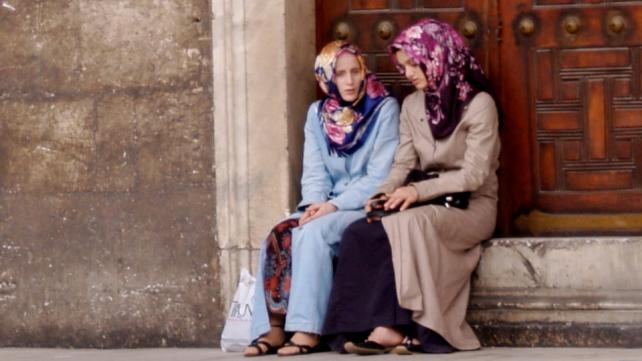
“O you Children of Adam! We have bestowed on you raiment to cover your shame as well as to be an adornment to you. But the raiment of righteousness, that is the best. Such are among the Signs of Allah, that they may receive admonition” (Quran 7:26).
In the United States, many non-Muslim women take great pride in what they consider to be their freedom to wear (or not to wear) whatever they please.
Particularly in the summer, the majority of non-Muslim women fail to demonstrate any vestige of modesty.
The appalling parade of halter tops, tight mini-shorts, skirts barely wider than belts, bikinis, and thong bathing suits leaves nothing to the imagination.
Trying to protect their eyes from the sinful scenery, pious Muslims avoid going to beaches and lakes during the tourist season only to discover similar shameless exhibitions in their neighborhood grocery stores, malls, and libraries.
The standard summer question: "Aren't you hot?"
Muslimas who dress according to the guidelines of the Quran and Sunnah are constantly taunted and questioned, “Aren't you hot in all that clothing? How can you stand it? Don't you know it's too hot out here to wear all that?”
Thinking to themselves, “Well, this is not as hot as the hellfire,” many sisters patiently try to explain the wisdom of covering both as a sunscreen and protection from the lewd leering of disrespectful men.
To support their position, Muslimas can point to many problems in American society that result from this preoccupation with displaying women's sexuality.
The astounding increase of AIDS and numerous sexually transmitted diseases, date rape, pregnancy among unmarried teens, and sexual harassment in the workplace are all linked to the wanton display by women of what Allah has ordained should be concealed.
From cancer-causing breast implants to dangerous liposuction, and from anorexic self-starvation to fungal infections and costly false fingernails, the obsession with physical attractiveness leads many American women to inflict on themselves excruciating and unnecessary forms of abuse.
Some Muslim women succumb to the influence
Nevertheless, some Muslim women foolishly succumb to the influence of America's degradation of women.
Weakly rationalizing their sad and desperate efforts to gain approval from their non-Muslim neighbors and co-workers, too many Muslim women on this continent are modifying, compromising, or all together abandoning the Quranic injunctions of proper covering, known as Hijab.
Alhamdulillah, Muslimas in North America can draw inspiration and important lessons from the events that have taken place over the past fifteen years in Turkey.
The valiant women of Turkey
Immediately after the destruction of what Western historians termed the “Ottoman Turkish Empire” (actually, the Uthmani Caliphate), there came the secular reforms of Mustafa Kemal Ataturk, allegedly for the goal of modernization.
In defense of the stability of their nation, by equating the threat of Islamic fundamentalism with that of Communism, Ataturk and subsequent Turkish rulers have claimed that, though they do not interfere with the private lives of their citizens, regulations to protect secularism had to be applied in pubic institutions.
One such secularist regulation prohibited the wearing of Hijab in universities and government offices.
In 1982, the Turkish Ministry of Education banned all students at Imam-Khatib schools from covering their heads, women students being no exception.
In response, the Supreme Religious Council, Turkey's religious authority, issued a statement explaining that the wearing of the head scarf, the Khimar, is part of Hijab, and is mandatory for Muslim women.
Nevertheless, the regulation was not altered, so female students withdrew from the schools by the thousands. Their withdrawal demonstrated their courageous refusal to compromise Islamic principles even though it meant sacrificing their education and their careers.
For example, in 1983, Sister Ayse Toroman dropped out of Ankara University during her sixth and final year as a medical student there.
Only five months before her graduation, Toroman decided that the policies against Hijab left her no alternative but to forfeit her goal of becoming a doctor.
Clearly, for Toroman and countless others like her, the goal of Jannah took precedence above all else.
Likewise in 1986, in Istanbul, because of her insistence on wearing Hijab, Sister Rabia Yilmaz, an outstanding student from the Faculty of Medicine, was denied the right to deliver the valedictorian speech, which she had earned through her academic accomplishments.
Muslim women professionals not left unscathed
Turkish governmental policies not only interfered with student aspirations, but even with the careers of established Muslim women professionals.
In 1984, Sister Nebahat Koru, a professor at Izmir's Ege University, was terminated from her position because she insisted on wearing the Khimar. Koru's dismissal was particularly startling because of her expertise. Koru, a Ph.D. in chemical engineering, had arranged international symposia on solar energy, co-founded Turkey's Solar Energy Institute, and taught thermodynamics and heat transfer courses at the university for ten years.
Ironically, Koru's indignation was heightened by the fact that she had worn Hijab without incident for two years in the United States during her post-doctorate research at the Massachusetts Institute of Technology. Yet the same attire was deemed unacceptable in her Muslim-majority homeland of Turkey.
“Modernist” opposition to the Hijab in Turkey
Regrettably, not all of the women in Turkey would agree with Koru on the question of Hijab.
As in America, Turkey has some women professing to be Muslims who fail to understand that the Quran is very explicit on this matter and that a Believer has no option in matters that Allah has clearly ordained.
The most glaring example of this type of thinking comes from Tansu Ciller, who regularly appears in public wearing make up and not even the pretense of Hijab.
Ciller was Turkey's first female leader and (at the time this article was published) continues to pilot her nation's pro-Western True Path Party.
Because of a coalition formed between her party and that of (now deposed) Prime Minister Necmettin Erbakan's Welfare Party which currently dominates the government (and which is now banned in Turkey), Ciller was recently appointed deputy prime minister and foreign minister of the cabinet.
In Ankara on July 5, 1996, Ciller is reported to have stated, “I am in this struggle against all kinds of interest groups, for my young people, and my women. I am your defender and guarantee. I am also the guarantee of the secular republic.”
Obviously, such statements do not reflect recognition of the fact that Islam is a complete way of life which cannot be compartmentalized as a mere set of rituals and religious acts.
Apparently unaware of the fact that Islam truly liberated women fourteen centuries ago, and that Hijab, in fact, frees women of the burden of being seen as sexual objects, Ciller's statements typify the so-called “modernist” approach to Islam.
Recent reports indicate that (now deposed) Prime Minister Necmettin Erbakan has appointed two additional women to serve as state ministers in his cabinet, but their views about Hijab have yet to be revealed.
Sisters in HIjab remain steadfast
Nevertheless, thousands upon thousands of brave and steadfast Turkish sisters continue to wear Hijab despite all of the economic, political, as well as social pressures to stop them.
Their courageous example makes it clear that in America, where religious freedom is vigorously protected and challenges to discrimination on the basis of religious dress have strong legal precedence, Muslim women simply have no valid excuses to ignore the Wisdom and Guidance from Allah:
“And say to the believing women that they should lower their gaze and guard their modesty; that they should not display their beauty and ornaments except what must ordinarily appear therof; that they should draw their veils over their bosoms and not display their beauty except to their husbands, their fathers, their husbands' fathers, their sons, their husbands' sons, their brothers, or their brothers' sons or their sisters' sons, or their women or the servants whom their right hands possess, or male servants free of physical needs, or small children who have no sense of the shame of sex, and that they should not strike their feet in order to draw attention to their hidden ornaments. And O you Believers, turn you all together towards Allah, that you may attain Bliss” (Quran 24:31).
Photo Attribution: http://commons.wikimedia.org/wiki/File:Turkey,_Istanbul,_Sultan_Ahmet_Camisi_(Blue_Mosque)_(3945168119).jpg








Add new comment